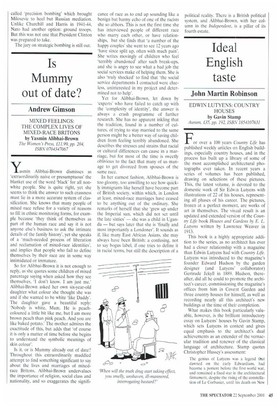Is Mummy out of date?
Andrew Gim s on
MIXED FEELINGS: THE COMPLEX LIVES OF MIXED-RACE BRITONS by Yasmin Alibhai-Brown The Women's Press, £11.99, pp. 204, ISBN 0704347067 Yasmin Alibhai-Brown dismisses as `extraordinarily naive or presumptuous' the blanket use of the word 'black' for all nonwhite people. She is quite right, yet she seems to think the answer to such crassness must lie in a more accurate system of classification. She knows that many people of mixed race refuse for a variety of reasons to fill in ethnic monitoring forms, for example because 'they think of themselves as part of the human race and say it is not anyone else's business to ask the intimate details of the family history', yet she speaks of a 'much-needed process of liberation and reclamation of mixed-race identities', and implies that people who fail to define themselves by their race are in some way intimidated or immature.
So for Alibhai-Brown it is not enough to reply, as she quotes some children of mixed parentage saying when asked how they see themselves, 'I don't know. I am just me.' Alibhai-Brown asked her own six-year-old daughter what colour she thought she was and if she wanted to be white `like Daddy'. The daughter gave a beautiful reply: 'Nobody is white, Mum. He is peachcoloured a little bit like me. but I am more brown peach than pink peach. And you are like baked potato.' The mother admires the exactitude of this, but adds that 'of course it is only a matter of time before she begins to understand the symbolic meanings of skin colour'.
Is it, or is Mummy already out of date? Throughout this extraordinarily muddled attempt to find something significant to say about the lives and marriages of mixedrace Britons. Alibhai-Brown undervalues the importance of religion, social class and nationality, and so exaggerates the signifi
cance of race as to end up sounding like a benign but barmy echo of one of the racists she so abhors. This is not the first time she has interviewed people of different race who marry each other, or have relationships, but she finds that 'a number of the happy couples' she went to see 12 years ago `have since split up, often with much pain'. She writes movingly of children who feel 'terribly abandoned' after such break-ups, and she is angry to see what a bad job the social services make of helping them. She is also `truly shocked' to find that `the social service departments I contacted were clueless, uninterested in my project and deter mined not to help'.
Yet for Alibhai-Brown, let down by `experts' who have failed to catch up with the 'complexity of identity', the answer is always a crash programme of further research. She has no apparent inkling that the tradition, found in a number of cultures, of trying to stay married to the same person might be a better way of saving children from feeling terribly abandoned. She describes the stresses and strains that racial or cultural differences can cause in a marriage, but for most of the time is sweetly oblivious to the fact that many of us manage to get divorced from spouses of the same race.
In her earnest fashion, Alibhai-Brown is too gloomy, too unwilling to see how quickly immigrants like herself have become part of British society, within which, in London at least, mixed-race marriages have ceased to be anything out of the ordinary. She remarks of herself that she `grew up under the Imperial sun, which did not set until the late sixties' — she was a child in Uganda — but says later that she is 'finally and most importantly a Londoner'. It sounds as if, like many East African Asians, she may always have been British: a confusing, not to say bogus label, if one tries to define it in racial terms, but still the description of a political reality. There is a British political system, and Alibhai-Brown, with her column in the Independent, is a pillar of its fourth estate.










































































 Previous page
Previous page